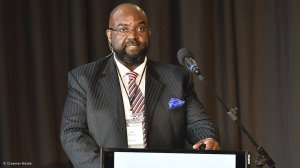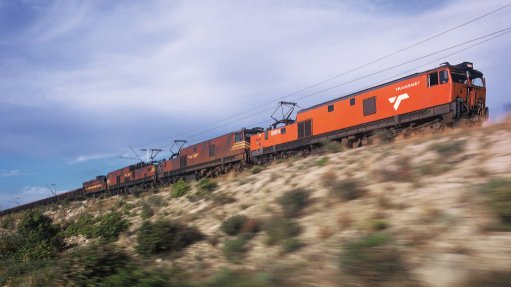Auto associations call for targeted govt support in NEV transition

Naamsa | The Automotive Business Council CEO Mikel Mabasa has expressed concern about the fast pace at which other African countries are growing their automotive production capacity, resulting in a decrease in South Africa's market share. Video: Shadwyn Dickinson; Editing: Nicholas Boyd.
Naamsa | The Automotive Business Council CEO Mikel Mabasa has made a clarion call for government to provide more targeted support to the automotive sector, if it is to transform to manufacturing new energy vehicles (NEVs).
At a 'Made in Tshwane'-themed automotive roundtable event held in Pretoria on June 29, Mabasa expressed concern that South Africa is fast losing its market share of African vehicle manufacturing, adding that purposeful government support could help turn the situation around.
The South African production market share for vehicles and components in Africa has gone down from 76% in 2012 to 54% in 2022, mostly owing to advances made in the automotive industries of Ghana, Morocco, Nigeria and Egypt.
Many of these countries are located close to Europe, shortening the time it takes to transport vehicles to that continent. For example, it takes four hours to transport vehicles from Morocco to Europe, compared with eight days from South Africa to Europe, provided there are no port delays.
There are instances where ships are not able to dock at the Durban port, owing to logistical challenges.
Mabasa cited the example of Morocco moving at aircraft speed to grow its NEV manufacturing industry, including through 16 South African engineers that had left the country to work in Morocco.
The country targets producing one-million electric vehicles (EVs) a year in coming years.
South Africa has three manufacturing hubs in the country, based in KwaZulu-Natal, the Eastern Cape and Gauteng, with KwaZulu-Natal accounting for 44.6% of vehicles produced in 2022, followed by 28% in Gauteng.
Mabasa said there were opportunities for Gauteng to expand vehicle manufacturing capability, particularly since the province was the information technology hub of the automotive industry, with the most research institutions being based there.
He confirmed that two more original-equipment manufacturers were keen on producing vehicles in South Africa, following global automaker Stellantis signing a framework agreement with government in March to manufacture vehicles in South Africa.
This shows that, despite challenges related to loadshedding and logistics, the country is still an attractive automotive investment destination.
To improve the sector’s contribution to gross domestic product and support NEV production, Mabasa said government could work on its “awkward policy development system” and allow municipalities and provinces to develop policy from the bottom-up, instead of the top-down approach to policy development driven by national government.
Further, the automotive industry reports to the Department of Trade, Industry and Competition (DTIC), which, considering the multitude of industries reporting to the department, does not have sufficient capacity to provide dedicated support to the automotive industry.
In contrast, Mabasa mentioned that the agriculture and mining sectors, which are also massive contributors to the country’s manufacturing output, each have a whole department with over 3 000 officials that support the industry, not to mention that each province has an agricultural department as well.
The automotive industry has to rely on six officials within the DTIC to formulate policy, Mabasa noted.
“It is about time that as a country we look at institutions that we already have in local and provincial government to support the industry. We have institutions in Gauteng and the Eastern Cape, for example, so there is no reason not to create policy capability within our own automotive Industry Development Centres, to support the work of the DTIC.
“The time has come for South Africa to recalibrate how it uses its structures within municipalities and provincial governments to help introduce policy papers, instead of national government filtering down,” Mabasa explained.
Moreover, he said South Africa produces six of the minerals required for battery manufacturing, but these are currently being shipped to markets such as China, which beneficiates the products that South Africa again imports.
Mabasa highlighted the need to transform away from this pit to port model and accelerate NEV value chain development.
He said South Africa had a unique opportunity to work in a collaborative manner to move the needle on NEV manufacturing.
National Association of Automotive Component and Allied Manufacturers CEO Renai Moothilal agreed, stating that many companies were already manufacturing and exporting NEV components in South Africa, including wheel hubs going to the US and anodes going into fuel cell EV production.
He explained that vehicle export values were among the elements at risk if the sector did not transform to manufacturing NEVs at an accelerated pace. The kinds of components servicing the internal combustion engine market made up R70-billion of export value, which could be at risk of being lost in the global NEV transition.
Three sets of NEV components had high localisation potential, Moothilal pointed out, listing these as electric motors and transmissions, power electronic databases and high-voltage electrical distribution systems. Other components that could be considered were thermal management systems, high-voltage wiring harnesses and, where relevant, hydrogen fuel cells and tanks.
Moothilal acknowledged that the automotive industry had long benefitted from policy support through various iterations of national policy, however, the industry still lacked production incentives for NEVs and not much progress was being made on the targets within the Automotive Master Plan.
“What many people miss is the underlying foundation of institutionalisation. Thailand is leaps and bounds ahead because they have an Automotive Sector Development Act, meaning automotive producers in Thailand have a legislated mandate to deliver.”
Meanwhile, Tshwane Economic Development Agency projects and investment committee chairperson Jan Mocke and Tshwane city manager Johann Mettler both committed to the city’s willingness to provide the industry what it needs to accelerate NEV manufacturing in the Gauteng Northern Corridor, of which Tshwane forms part.
Both agreed the country should not end up in a situation where it had to catch up and be reactive to global changes in the automotive sector, rather, South Africa should be proactive in transforming the sector, including through skills development.
Mettler pointed out that Tshwane had the highest concentration of innovation hubs and research facilities, with a very strong student economy. “As we transition to NEVs, we need new skills. The last thing we want is to have these skills leaving the country.”
He added that cities could stay ahead of the curve in driving NEVs, despite national policy lagging. In particular, Mettler said, the city was working on its administrative processing, which government was notoriously bad at, as well as partnerships for alternative funding models.
Mettler pointed out that the city recently established the Tshwane Property Development Forum to tackle investment challenges in the property development sector and position Tshwane as an impactful investment destination.
Other existing structures also help to ensure investors are not subject to red tape when expanding their business.
“Time is not on our side. We have to move with the necessary speed to realise more automotive development proposals,” Mettler concluded.
*The Made in Tshwane roundtable was hosted by the Tshwane Economic Development Agency, the Gauteng Department of Economic Development, the Gauteng Growth and Development Agency and the Automotive Industry Development Centre.
Comments
Announcements
What's On
Subscribe to improve your user experience...
Option 1 (equivalent of R125 a month):
Receive a weekly copy of Creamer Media's Engineering News & Mining Weekly magazine
(print copy for those in South Africa and e-magazine for those outside of South Africa)
Receive daily email newsletters
Access to full search results
Access archive of magazine back copies
Access to Projects in Progress
Access to ONE Research Report of your choice in PDF format
Option 2 (equivalent of R375 a month):
All benefits from Option 1
PLUS
Access to Creamer Media's Research Channel Africa for ALL Research Reports, in PDF format, on various industrial and mining sectors
including Electricity; Water; Energy Transition; Hydrogen; Roads, Rail and Ports; Coal; Gold; Platinum; Battery Metals; etc.
Already a subscriber?
Forgotten your password?
Receive weekly copy of Creamer Media's Engineering News & Mining Weekly magazine (print copy for those in South Africa and e-magazine for those outside of South Africa)
➕
Recieve daily email newsletters
➕
Access to full search results
➕
Access archive of magazine back copies
➕
Access to Projects in Progress
➕
Access to ONE Research Report of your choice in PDF format
RESEARCH CHANNEL AFRICA
R4500 (equivalent of R375 a month)
SUBSCRIBEAll benefits from Option 1
➕
Access to Creamer Media's Research Channel Africa for ALL Research Reports on various industrial and mining sectors, in PDF format, including on:
Electricity
➕
Water
➕
Energy Transition
➕
Hydrogen
➕
Roads, Rail and Ports
➕
Coal
➕
Gold
➕
Platinum
➕
Battery Metals
➕
etc.
Receive all benefits from Option 1 or Option 2 delivered to numerous people at your company
➕
Multiple User names and Passwords for simultaneous log-ins
➕
Intranet integration access to all in your organisation



















